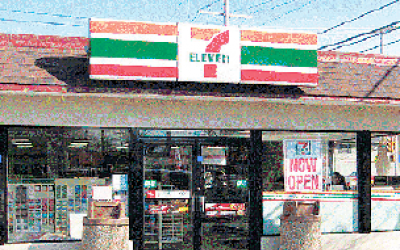The Mineola Village Board won the first round in a court battle with 7-Eleven when a state Supreme Court judge recently ruled that the board was “specific, detailed and rational” in rejecting the convenience store chain’s application for a location on East Jericho Turnpike.
Village of Mineola Mayor Scott Strauss announced the village was “victorious” in the initial ruling of the lawsuit filed by 7-Eleven in April on Wednesday night’s village board workshop session.
“I’m very happy. This is one good step in our direction,” Strauss said.
In her ruling on a lawsuit brought against the village board by 7-Eleven, Nassau County Supreme Court Judge Michele Woodard’s wrote “it cannot be said that the [Village of Mineola] acted in an arbitrary and capricious manner.” The Amato Law Group, 7- Eleven’s legal counsel, had used those words in its court filing to characterize the Mineola board’s action in rejecting its client’s application for a special permit to sell food on the site.
Woodard’s decision issued to the village on Oct. 4 stated the site at 400 East Jericho Turnpike is on a “heavily-traveled road,” that “abuts a predominately one-family residential area which is likely to be diminished in safety, comfort, serenity and value.”
Woodard wrote that the village trustees could “rely on their own local knowledge and familiarity with the property and the surrounding area, as well as the operation of convenience stores” and described their reasons in denying the special permit as “specific, detailed and rational.”
Strauss said the board unanimously rejected 7-Eleven’s application primarily because of safety concerns. He said 7-Eleven has 30 days to appeal the decision.
In its court filing, Amato argued that the evidence submitted by its client’s experts in a public hearing on Oct. 12, 2011 satisfied requirements for the special use permit.
At that public hearing, Mineola residents came out in force to express their opposition to the store’s proposed location on the border of a residential neighborhood at the intersection of East Jericho and Jay Court. They expressed concerns about the store’s impact on traffic in the neighborhood. They also voiced concerns about late night noise and alcohol sales and the potential of a resulting devaluation of their houses. “No expert testimony or reports were presented in opposition to the application by community members,” Judge Woodard wrote.
Woodard said that although parking for the store would conform with the village’s zoning law, the village board had said in its ruling that delivery truck maneuvers would be a “challenge” on the property. The judge said the multiple directions of traffic movement on the site “present numerous foreseeable vehicular conflicts” that would be “further exacerbated” by delivery trucks.
She also noted that while 7-Eleven representatives said only box trucks would be used for deliveries, the village trustees said use of tractor trailers for deliveries was a “foreseeable serious hazard” at the site.
She wrote that the “overwhelming” objection of the residents was “buttressed by the knowledge and experience of the board members.”
In its decision, the village board concluded that safety would be compromised by any level of congestion at the entrance of the proposed location, stating, “If more than two vehicles attempt to access the site from Jericho Turnpike and encounters an entrance delay at the curb cut, exposure to collision risk would occur to vehicles which failed to clear Jericho Turnpike.”
Currently vacant, the former site of a gasoline service station comprises 13,755 square feet of area, approximately one-third of an acre.



